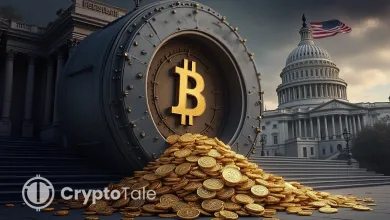BlackRock’s IBIT Holds Over 700K BTC as It Closes in on Satoshi’s Total

- BlackRock’s ETF holds 700,439 BTC after a $164.6M inflow pushed its total value over $75.5B.
- The ETF gains 1,300 BTC every day and could reach 1.2M BTC by May 2026 at this pace.
- All US spot ETFs combined hold over 1.25M BTC, which is more than Satoshi’s estimated stash.
BlackRock’s spot Bitcoin ETF has crossed 700,000 BTC, valued at approximately $75.5 billion, following a $164.6 million inflow on July 7. This puts the firm just 38% away from matching the estimated 1.1 million BTC held by Satoshi Nakamoto, Bitcoin’s pseudonymous creator. According to Apollo co-founder Thomas Fahrer and Bloomberg ETF analyst Eric Balchunas, BlackRock’s iShares Bitcoin Trust (IBIT) holds exactly 700,439 BTC. Balchunas confirmed the firm is acquiring 40,000 BTC monthly, equal to approximately 1,300 BTC daily.
BlackRock controls over 55% of all Bitcoin held by U.S. spot ETFs. These include other major players such as Grayscale with 229,418 BTC and Fidelity with 204,118 BTC. Together, U.S. spot ETFs now hold between 1.25 and 1.26 million BTC, already surpassing Satoshi’s dormant stash, which remains untouched since 2011. If IBIT’s pace continues, it is projected to hold 1.2 million BTC by May 2026.
Centralization Raises Questions Over Bitcoin’s Core Ethos
BlackRock’s rise as a dominant Bitcoin holder has brought renewed attention to decentralization and governance. BTC was designed as a peer-to-peer currency that does not have control from central powers. However, the current ETF structure consolidates control of BTC within a few regulated custodians. This concentration introduces risks tied to legal action, regulatory shifts, or internal firm decisions.
Unlike Satoshi’s untouched wallet, ETFs like IBIT actively manage and accumulate BTC on behalf of investors, shifting custody from individuals to institutions. This challenges the cypherpunk ideal of self-sovereignty, which advocated for trustless systems where users controlled their own private keys. Instead, today’s investors increasingly opt for regulated custodians under corporate frameworks.
The asset distribution of Bitcoin is becoming increasingly top-heavy, despite the cryptocurrency’s decentralized network. The rise of ETF-based ownership highlights the transition toward centralized asset management, facilitated by a decentralized protocol. This brings in weaknesses that the early Bitcoin community was trying to prevent.
Wall Street vs Crypto-Native Vision: A Growing Divide
BlackRock’s IBIT has become one of its most profitable ETFs, outperforming even its S&P 500 fund in management fee revenue. Since launching in January 2024, IBIT has delivered an 82.7% return. Analysts note that most IBIT investors are long-term holders, which reduces price volatility and fosters stability.
Yet, critics have given a warning that the convenience and ease of access through ETFs come at the cost of individual autonomy. Wall Street’s entry into Bitcoin brings scale, regulation, and liquidity, but risks embedding financial middlemen into a system designed to avoid them. This contradiction is creating a narrative around “centralized decentralization.”
Those who buy large amounts of Bitcoin, like BlackRock, now consume more BTC than the market supplies. In 2025, ETFs and firms like Strategy purchased $28.2 billion in BTC, while miners produced only $7.85 billion worth. This consumption far outpaces the new supply and places significant influence in the hands of regulated entities.
Related: The First Spot Solana Staking ETF Hits $33M in Trading Volume on Day One
Could Institutional Control Shift Bitcoin’s Future?
Institutional ETFs holding more BTC than the monthly mined output introduce supply compression. Any change in mood or the change in strategies of firms may result in massive selling that may cause sharp price fluctuations. This power held by these companies may dictate how price is perceived, the level of liquidity, and even investor enthusiasm.
Balchunas highlighted in his tweet that BlackRock is on track to surpass Satoshi Nakamoto. He noted that if all ETFs are viewed as a single entity, they have already done so. This scenario raises the question: Can a decentralized asset truly remain free if ownership becomes centralized?
The aspects of steady flows and institutional support for IBIT are fueling its expansion, which is altering the story of those truly controlling Bitcoin. The network may also remain trustless and transparent, but at the same time, its financial footing is gradually being solidified by the significant interests of the conventional finance establishment.




